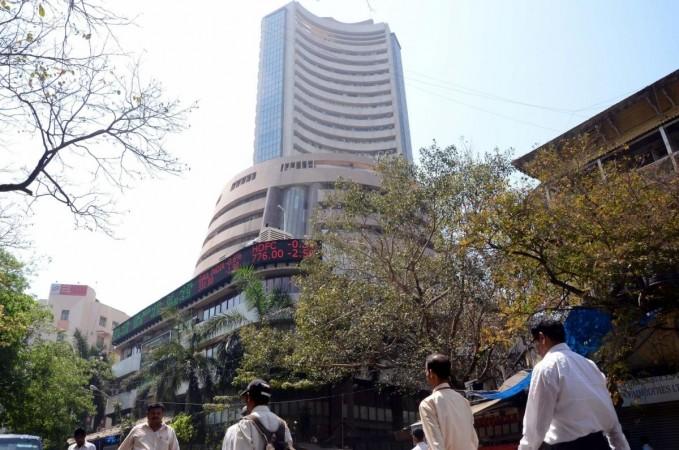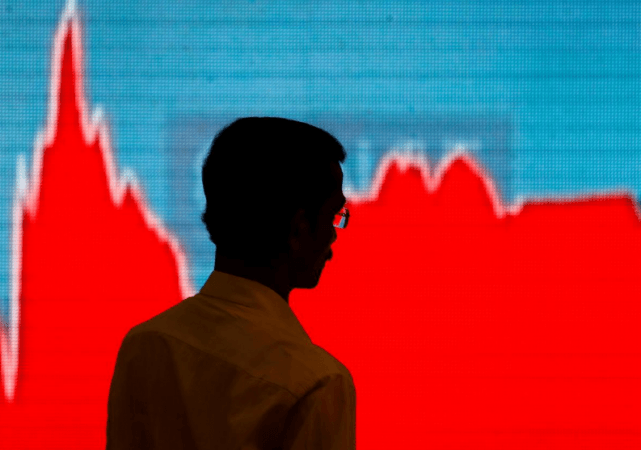Global headwinds triggered via Russia's attack on Ukraine heavily dented India's domestic equity markets as well as the rupee on Thursday.
The indices -- S&P BSE Sensex and NSE Nifty50 -- logged its second worst day since March 2020 on Thursday as foreign investors fled.

The FIIs were net sellers on BSE, NSE and MSEI in the capital market segment on Thursday. They net sold Rs 6,448.24 crore worth of equities.
Subsequently, Sensex settled 4.7 per cent or 2,702 points down at 54,529 points, whereas Nifty settled 4.8 per cent or 815 points down at 16,248 points.
"Nifty logged its second worst day since March 2020 on Thursday, due to the escalation of the geo-political crisis in Ukraine. Nifty opened with a large gap down and kept falling through the day to close almost at an intra-day low. In the process, Nifty was the worst performing index in the Asian region," said Deepak Jasani, Head of Retail Research, HDFC Securities.
The Indian rupee too became a casualty of the ongoing Russia-Ukraine hostilities as it weakened by over 1 per cent on Thursday.
It weakened by 1.3 per cent to Rs 75.65 per USD from its Wednesday's close of Rs 74.55.
"The RBI let the rupee loose today with no big intervention and allowed it to catch up with other currencies and align with the domestic fundamentals," said Sajal Gupta, Head, Forex and Rates, Edelweiss Securities.
"The rupee did perform maturely this time and saw orderly depreciation on the back of $630 billion-strong reserves," Gupta added.
Besides, the conflict is expected to impact India's domestic economy in the coming days as it has accelerated the prices of crude oil, gold and silver.
At present, India is import-dependent to fulfil its crude oil needs, importing 85 per cent of its crude oil requirements.
Any rise in crude oil prices will have a major impact on domestic prices of petrol and diesel. And the cascading effect of higher fuel cost will trigger a general inflationary trend.
Already, India's main inflation gauge -- the Consumer Price Index (CPI), which denotes retail inflation -- crossed the target range of the Reserve Bank of India in January.
The rise was blamed on high commodity costs.
As per industry calculations, a 10 per cent rise in crude oil prices adds nearly about 10 basis points in CPI inflation.

"Crude prices at such higher levels will increase the retail fuel prices by around Rs 8-10 per litre and could create inflationary pressure. Although the oil marketing companies (OMCs) have not increased retail prices since November 21 last year, the same could be seen post the Assembly elections in five states," said Bhanu Patni, Senior Analyst, India Ratings and Research.
On Thursday, the Brent-indexed crude oil price climbed to $105 a barrel after Russian President Vladimir Putin announced a military operation in Ukraine.
This is the first time since 2014 that crude oil prices have crossed the $100 per barrel mark.
On the NYMEX WTI index, the crude oil prices surged by 5.50 per cent near the $97.22 per barrel range.
"Crude at over $100 per barrel would increase the import bill, current account deficit and thereby depreciation of the rupee vis-a-vis US dollar and lead to inflation," said Prashant Vasisht, Vice President and Co-head, Corporate Ratings, ICRA.
"The upstream companies would benefit from higher crude oil prices. Besides crude oil, gas prices are also expected to increase as Europe gets a large proportion of gas through pipelines passing through Ukraine," Vasisht added.
Currently, Russia is one of the world's top producers of crude oil and any western sanctions against the country will stiffen global supply.

















